Last updated on February 15th, 2024 at 04:04 pm
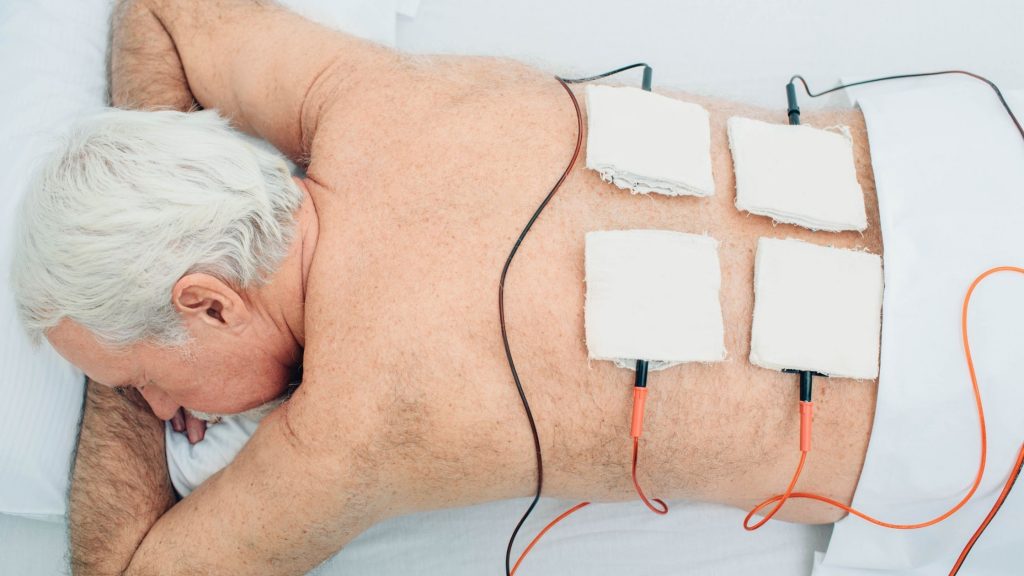
- Interferential therapy is a type of electrical stimulation used in physiotherapy.
- It uses two electrical currents that intersect and create a therapeutic frequency.
- This frequency can help reduce pain, inflammation, and muscle spasms.
- Interferential therapy can also improve circulation and promote healing.
- It is often used for conditions such as back pain, arthritis, and sports injuries.
IFT physiotherapy simply means physiotherapy treatment given through an IFT machine. the IFT stands for Interferential Therapy which uses electrical stimulation to cure musculoskeletal pain such as cervical spondylosis, low back pain, knee pain, tennis elbow pain. IFT uses two medium frequency current that interferes to produce a beat frequency.
It gives a soothing and pain-relieving effect when applied, it is typically applied for 10-20 minutes duration. In this article, we will try to understand what is interferential therapy? How it is applied and how it helps to relieve pain.
Interferential Therapy vs TENS
Interferential therapy is a very integral part treatment process in physiotherapy. It is one of the several electrotherapy modes of treatment where electric current is used for getting the desired result. The other electrotherapy modes include ultrasonic therapy, shortwave diathermy, infrared lamp therapy etc.
The therapist often uses TENS therapy to help their patients. This therapy uses low-frequency alternating or direct current that is applied continuously. However, it is important to note that TENS therapy is most effective when it stimulates the nerves near the surface of the skin and does not penetrate deeper tissues.
This is because direct current and low-frequency alternating current above 1kHz face high resistance in the outer layer of the skin. As a result, treating deeper structures can be quite painful because a large cutaneous current is required for adequate current to flow deeply.
On the other hand, an alternating current of medium to high frequency (ranging from 1kHz to 10kHz) meets little resistance and can easily penetrate the tissue1. However, there was one problem with direct use of medium and high-frequency alternating currents. It oscillate too rapidly to directly stimulate the tissue which causes discomfort1.
During the 1950s, a solution was discovered for the issue with medium frequency alternating current. This solution involved utilizing crossing two medium frequency current to produce Interferential current. Which reduced sensory stimulus while still stimulating motor nerves for muscle contraction and offered deeper penetration in targeted areas. Additionally, it was found to be effective for pain treatment2.
What is Interferential Therapy?
As the name implies, Interferential Therapy (IFT) requires two currents that interfere with each other, producing a beat frequency. Specifically, two medium-frequency currents intersect to create IFT.
When two alternating currents with the exact same frequency and rising and falling at the exact same time, they are said to be in phase. But, when the frequency differs slightly they become out of phase as a falling segment of one wave coincides with a rising segment.
So, the waves in phase interfere constructively to produce resultant waves with amplitude greater than either of the original. And, waves out of phase interfere destructively to cancel each other out.
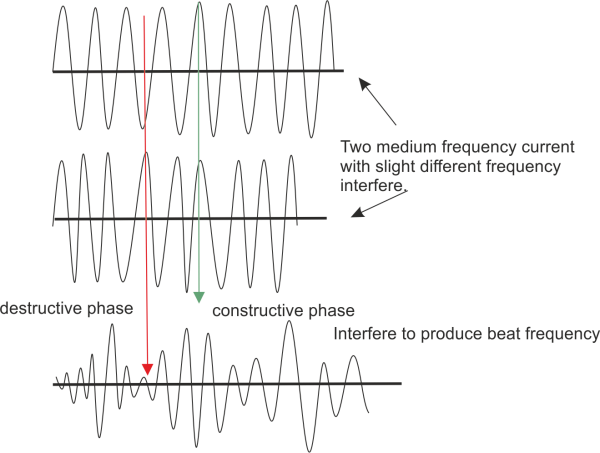
Let me further simplify it so that anyone can understand it and explain it with diagrams. Observe the diagram below, two medium frequency currents with slightly different frequencies interfere to produce a resulting beat frequency current. These two medium frequency current is of
This beat frequency is termed as Interferential current and the treatment process through this current is called Interferential Therapy.
Also read: Difference between faradic and galvanic current
How to use IFT machine
IFT machine comes in two forms, one is for professional use and another is a portable one which can be used by any layperson with little training. Both have a similar design but vary in features. Professional IFT consists of a machine with a control button and a display panel from where the intensity controls the supply of current. It comes with four external wires with a colour code.
One pair (two wires) is of black colour which forms one channel and another pair is of red colour which forms the other channel. One end of the wire has a connection to the machine and another end to electrodes.
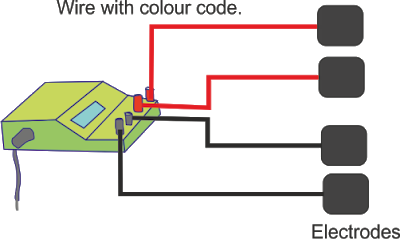
Electrodes are part of the machine that is directly connected to the treating body part. Electrodes can be made of metal or carbon rubber (
To apply electrodes over the body, the electrodes are covered with a wet lint pad (a special piece of cotton cloth made for this use). Many prefer gel rather than lint pads for placing the electrodes (note: the gel is used only for rubber electrodes).
Interferential therapy electrode placement simplified
You can easily learn to use a professional IFT device. For this first locate the painful spot, it may be the knee, shoulder, low back, or anything else. Apply electrode with lint pad/ gel as applicable around the spot.
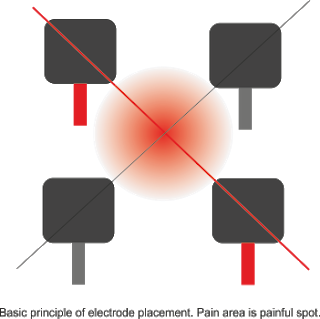
The
I have covered the IFT electrode placement for various joint pain in my Youtube videos. Here I’m sharing a video on how to use IFT for low back pain. For videos on other joint pain, please follow the links below.
- IFT pad placement for elbow joint pain.
- Electrode placement of IFT therapy for ankle joint.
- IFT placement for knee pain.
Effects of Interferential Therapy on our body
Interferential therapy helps improve blood flow by stimulating the pumping action of the muscle. Improved blood circulation helps to heal the swelling and inflammation and thereby reducing the pain. Pain also reduces after the application of the IFT machine by a mechanism called pain gait theory. Here are the bullet points of its effects:
- Pain relief- It gives instantaneous pain relief and a soothing effect.
- Muscle spasm relief- The continuous contraction & relaxation of muscle create a muscle pump effect thereby improving the blood circulation. Its massage effect relaxes the spasmodic muscle.
- Wound healing: Improved blood circulation helps in soft tissue repair.
- Swelling reduction: The muscle pump effect helps drastically in improving the swelling.
- Muscle relaxation.
Indication of IFT
IFT helps in the improvement of many painful conditions.
- Back pain.
- Neck pain like cervical
spondyl o sis , and neck muscle spasm. - Knee pain like osteoarthritis of the
knee . - Frozen
shoulder, shoulder pain.
Contraindications of interferential therapy (IFT)
These are the conditions where using IFT must be avoided.
- Bleeding area.
- Body part with metal implants.
- Loss of sensation, like in paralysis case.
- Recent fracture.
Important FAQ related to IFT
Keep reading: Motor points of face for electrical stimulation of bell’s palsy
The author is a physiotherapist who has been practising for the last 17 years. He holds a Bachelor's in Physiotherapy (BPT) from SVNIRTAR (Swami Vivekananda National Institute of Rehabilitation and Research), one of the prestigious physiotherapy schools in India.
Whatever he learns dealing with his patient, he shares it with the world through blogs and e-books. He also owns a YouTube channel, "Sunit Physiotherapist" with over 8 lakh active subscribers. Here, he shares everything he gets to learn serving the patient.
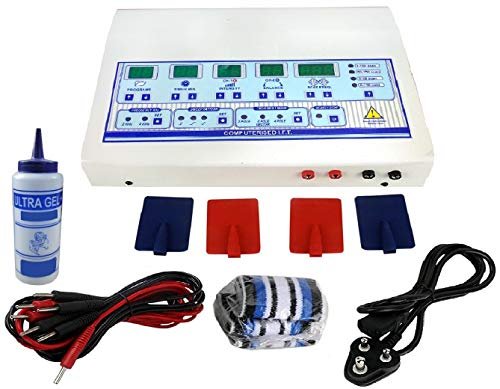
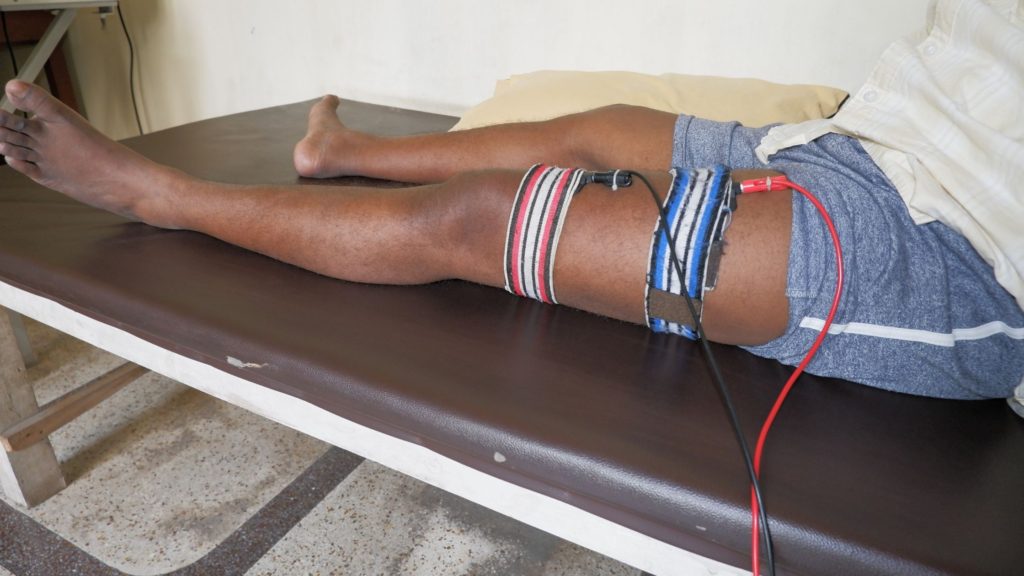
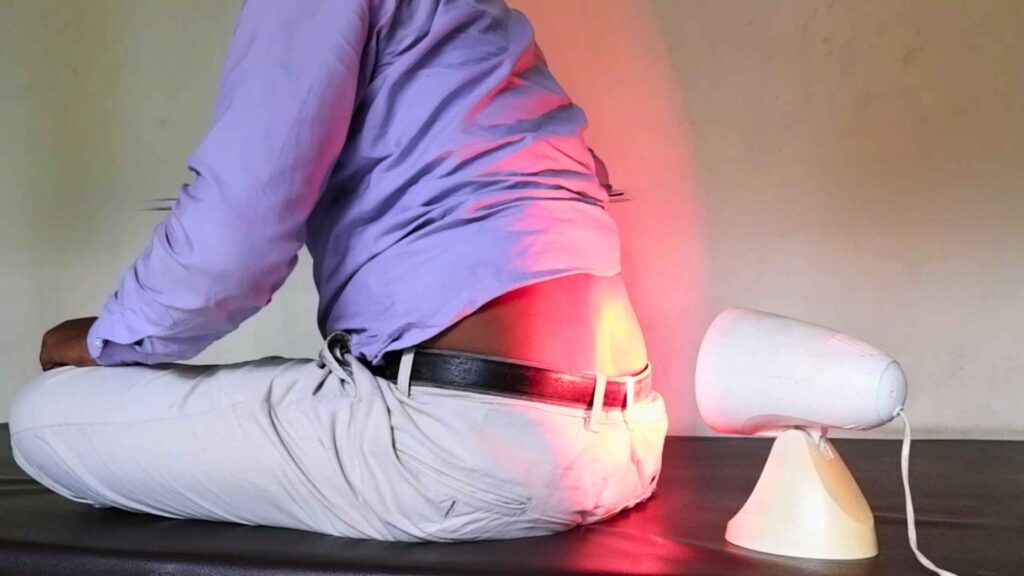
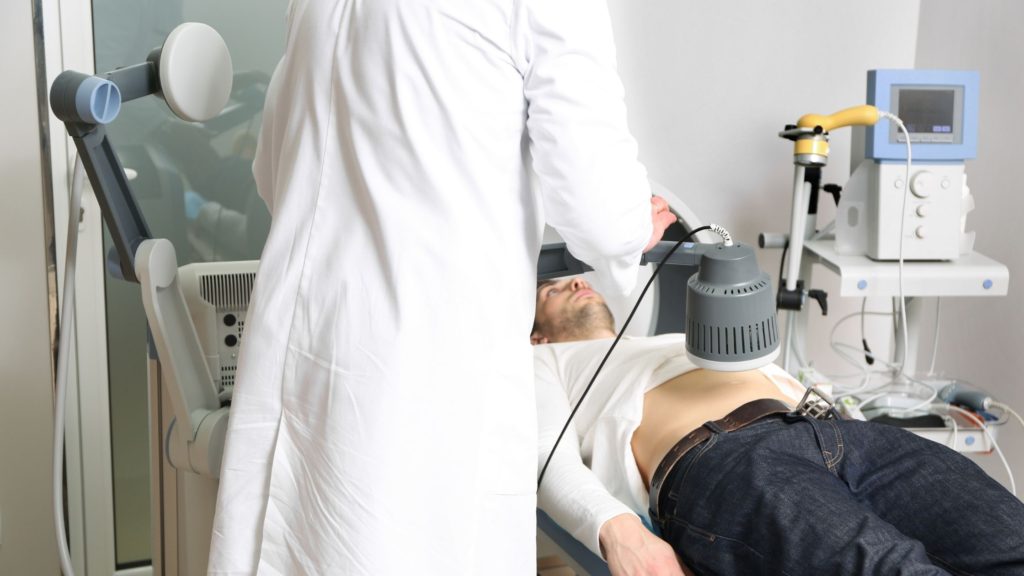
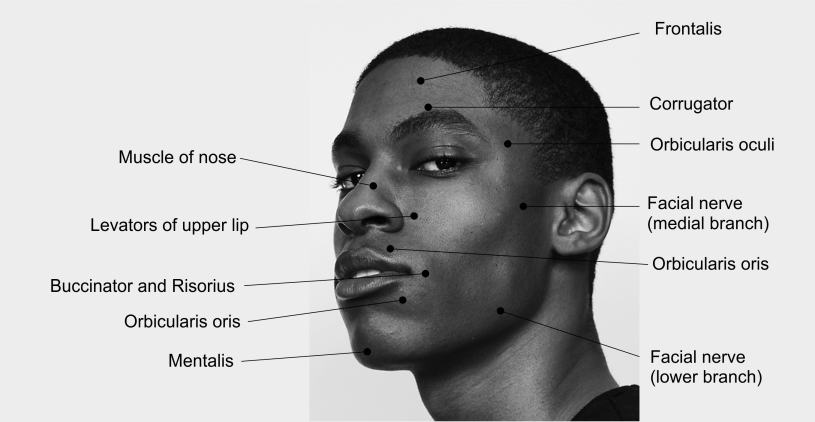
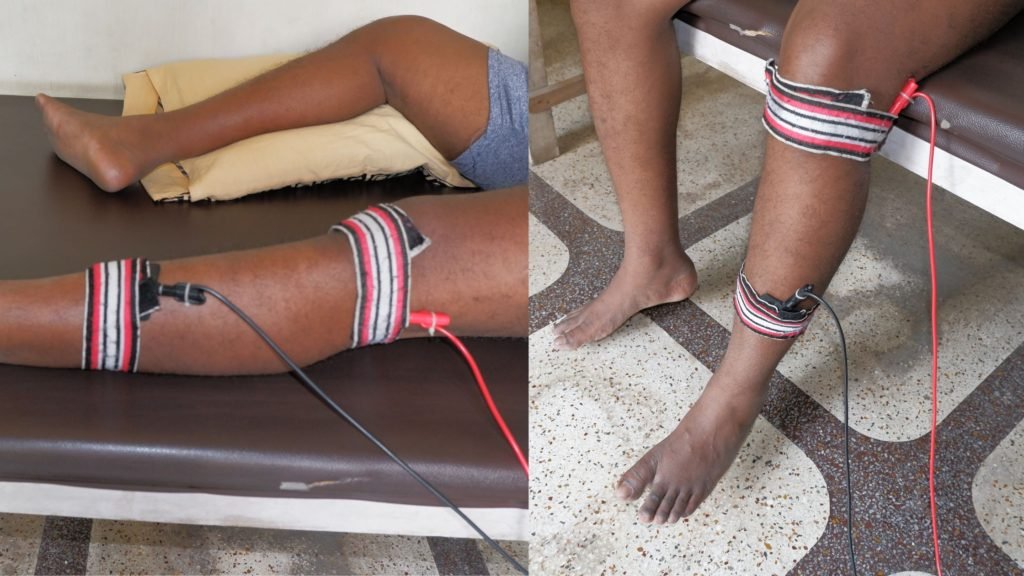
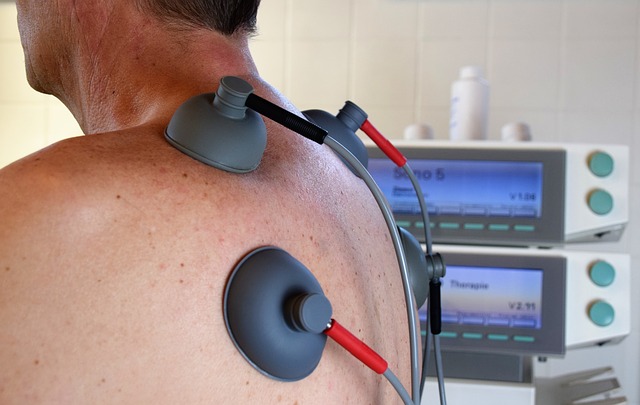
Pingback: Easy Clavicle Fracture Physiotherapy Exercises - Physiosunit
Pingback: Chronic Back Pain Exercises - Physiosunit
Pingback: What's Dinner Fork Deformity? Colle's Fracture Physiotherapy Management - Physiosunit
Pingback: What's Dinner Fork Deformity? It's Physiotherapy Management - Physiosunit
Why we should not apply IFT if patient have Deep vein thrombosis ?
2pole 4poles
excellent content
Sir plz discuss about how to select trtmnt modes in IFT( 2 pole 4 pole 4 pole vector)
Pingback: Knee physical therapy & best exercises for quick relief : Physiosunit
Pingback: What is a frozen shoulder: Causes, symptoms, physiotherapy : Physiosunit
Helpfull
Other than the thigh area, you can go for IFT treatment on rest of the body parts
I have done surgery for femur bone presently inplants are there in my body can i go for IFT treatment
I suffer spinel stenosis from last 6 month. Can I apply this type of treatment?? Is that cure my problem?? Please reply me. issss1818@gmail.com
Thnx
nice
You can treat through a metal implant. The power output from an IFT machine is a sixth the power from putting you hand on the part. It is only pacemakers that you have to worry about.
Someone asked me a question regarding use of IFT (since nor email was provided, I'm replying here).
Question was:
METAL ROD FIXED ON RT LEG.
BUT I HAVE PAIN AT LEFT SHOLDER ,ARM AND ALSO SUFFER BY SPONDY,CAN I GO FOR IFT TREATMENT FOR NECK PAIN,PL ADVICE.
Answer:
Since metal implant is fixed on the leg, you can easily have IFT treatment over any other body part except where implant is applied. So, there is no risk applying IFT over the other part of the body.